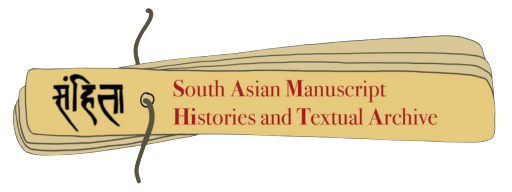Manuscripts
Search Filter
Vyākaraṇasūtrapāṭha (Aṣṭādhyāyī)
112450_V037A_4211_CS Language : Sanskrit Scripts : Devanagari
This is a Vyākaraṇa text on Pāṇinīyasūtrapāṭha by Pāṇini. The text documented 4002 sūtras from Aṣṭādhyāyī. In the colophon of the manuscript provides the title of the text, author's name, a divisions of the sections enumertion of sūtras according to types, total number of sūtras as well as date, part of which is abbreviated and uncertain, like eight chapters, subdivided into four sections called pādas (8 x 4 = 32), viṃśatisaṃkhyā 182 (20 x 182 = 3640), viṃśatyatiriktasūtrasaṃkhyā 362 (3640 + 362 = 4002), sarvasūtrasaṃkhyā 4002.
Sāṅkhyatattvaprakāśa
112451_V038A_4212_CS Language : Sanskrit Scripts : Devanagari
This is an incomplete manuscript on Sāṅkhya philosophy. This manuscript appearse to be a commentary on Īśvarakṛṣṇa's Sāṃkhyakārikā. Covering through the middle of kārikā 64.
Rasamañjarī
112452_V040A_4214_CS Language : Sanskrit Scripts : Devanagari
An incomplete manuscript on alaṅkāras by Bhānudatta Miśra. He was the son of Gaṇapati and grandson of Mahādeva. he was from Mithila and lived between 1350 and 1450 CE. The text focuses on the concept of rasas in Sanskrit literary works and discusses on its technicalites.
Amarakośa
112469_V045A_4216_CS Language : Sanskrit Scripts : Devanagari
A work of lexicography by Amarasiṁha (active 500 c.), containing synonyms for different categories of words. It is divided into three kāṇḍas, svargādikāṇḍa, bhuvargādikāṇḍa and sāmānyādikāṇḍa. The manuscript contains all the three chapters.
Dravyaguṇaśataślokī
112530_V039A_4213_CS Language : Sanskrit Scripts : Devanagari
An incomplete manuscript on Vaidyaśāstra by Trimalla Bhaṭṭa (1600-1650 CE.). Trimalla Bhaṭṭa was the eldest son of Vallabha, belongs to a Brāhmaṇa family, who lived in Kāsi. He was the gradson of Śiṅgaṇṇa Bhaṭṭa of Koṇḍapallī and elder brother of Rāma and Gopa. This text on classical Indian pharmacology is also known as Pathyāpathyanighaṇṭu or Śataślokī, is traditionaly said to have 100 verses.
Tarkasaṃgraha
112465_V042A_4217_CS Language : Sanskrit Scripts : Devanagari
A concise introduction to Nyāya-Vaiśeṣika written by Annambhatṭa in 1623 CE, showing how the universe can be analyzed through natural language. It belives that he was the son of Meligiri Tirumala and the pupil of Śesa vīreśvara. This is a corrupted text with a few mistakes from the original one.
Durghaṭakāvya
112467_V043A_4218_CS Language : Sanskrit Scripts : Devanagari
A work of this is lso called Durghaṭaślokas, which is a collection of about 85 difficult and incongruous verses ascribed to Kālidāsa. This manuscript has onl 60 verses, which are difficult and incongruous too with a commentary, the name of the commentator is anonymous. Though NCC mentioned one commentator Karuṇānanda (middle of 16th century CE), who wrote Durghaṭaślokaṭīkā.
Ekākṣarakośa
112468_V044A_4219_CS Language : Sanskrit Scripts : Devanagari
A text on lexicography. This text addressed it self as kośa. This is a complete manuscript, explains various words (starts with svara and vyañjana) and their synonyms. It has words from a to kṣa. Although the name of the author is not specified, it is likely to be Puruṣottamadeva whose name is given as author in most manuscripts, NCC also mentioned it.
Citrakāvya
112474_V046A_4220_CS Language : Sanskrit Scripts : Devanagari
A text on alaṅkāraśāstra by Mahānandakavi, an obscure author. It has a commentary Citraprapañca by Viśveśvara. NCC mentioned, that both the text (Citrakāvya and Citraprapañca) which is known as Citraprapañca, and the commentary were written by Viśveśvara. But in the colophon of this manuscript clearly mentioned that Mahānandakavi is the author of this text. The text explained an unique way of poetics with 16 diagrams depicted syllables.
Siddhāntakaumudī
112481_V047A_4221_CS Language : Sanskrit Scripts : Devanagari
A complete text on Siddhāntakaumudī by Bhaṭṭoji Dīkṣita (1547-1633 CE). NCC mentioned that he was the son of Lakṣmīdhara, brother of Raṅgojidīkṣita, father of Bhānuji and Viśveśvaradīkṣita, grandfather of Haribhaṭṭa, uncle of Koṇḍabhaṭṭa. This text has four different sections, each section starts with a new folio number, Tiṅanta (lakārārthaprakriyā) 124 folia (1-124, 15-16 folio is missing), Kṛdanta 77 folia (35-112), Svaravaidikī 84 folia (1-53, 54-84), Taddhitaprakriyā 62 folia, Liṅgānuśāsanasūtravṛtti 9 folia.
Rāmāyaṇavidhi
112482_V049A_4223_CS Language : Sanskrit Scripts : Devanagari
This is a ritual text with reference to, among others, the Rāmāyaṇa, and proper way to read the text with Hindu rituals. This work is a part of Mahākala Saṁhitā by Ādinātha, perhaps he was the author of this text, though the text has not mentioned any author.
Sarvamantrotkīlana
112483_V050A_4224_CS Language : Sanskrit Scripts : Devanagari
A Tantra text, it appearse to be a Śaiva-tantra work. The work is part of a large collections of mantras in the Śivarahasya Purāṇa.













